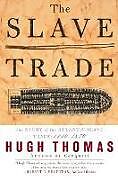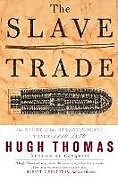The Slave Trade
Einband:
Kartonierter Einband
EAN:
9780684835655
Genre:
History
Autor:
Hugh Thomas
Herausgeber:
TOUCHSTONE PR
Erscheinungsdatum:
03.02.1999
Informationen zum Autor
Hugh Thomas is the author of "The Spanish Civil War, Conquest, " and many other books. A former Chairman of the Centre for Policy Studies (U.K.), he was made Lord Thomas of Swinnerton in 1981. He is currently a University Professor at Boston University. He lives in London.
Barbara Stanton Detroit Free Press Thomas has taken a sprawling subject and turned it into a disciplined, compelling narrative.
Autorentext
Hugh Thomas is the author of The Spanish Civil War, Conquest, and many other books. A former Chairman of the Centre for Policy Studies (U.K.), he was made Lord Thomas of Swinnerton in 1981. He is currently a University Professor at Boston University. He lives in London.
Klappentext
After many years of research, award-winning historian Hugh Thomas portrays, in a balanced account, the complete history of the slave trade. Beginning with the first Portuguese slaving expeditions, he describes and analyzes the rise of one of the largest and most elaborate maritime and commercial ventures in all of history. Between 1492 and 1870, approximately eleven million black slaves were carried from Africa to the Americas to work on plantations, in mines, or as servants in houses. The Slave Trade is alive with villains and heroes and illuminated by eyewitness accounts. Hugh Thomas's achievement is not only to present a compelling history of the time but to answer as well such controversial questions as who the traders were, the extent of the profits, and why so many African rulers and peoples willingly collaborated. Thomas also movingly describes such accounts as are available from the slaves themselves.
Leseprobe
INTRODUCTION
I remember as if it were yesterday the day when I began to be interested in the slave trade: it was thirty-three years ago. I was dining in London. At the table, among others, there was the prime minister of Trinidad, the historian Dr. Eric Williams. Hearing that I was making a study of the causes of the Cuban revolution, he expressed astonishment that I should contemplate writing such a book without reading his own works, such as A History of Trinidad and Tobago (completed, he spiritedly explained, in ten days while his people were celebrating Carnival) and, above all, Capitalism and Slavery, a copy of which came to my house next day, by messenger, from the Trinidad High Commission.
A swift perusal of the latter showed me the fascination of the eighteenth-century Caribbean, and I devoted much attention, in what became a history of Cuba, to slavery and the slave trade on that island.
I became particularly interested in a Basque, Julián Zulueta, the last great slave trader of Cuba (if you will permit the adjective) and, therefore, of the Americas, a man who started quite humbly, as a trader in all sorts of goods, in Havana in the 1830s but who, by the late 1840s, was a byword for iniquity in the minds (and logs) of the British naval patrol trying to prevent the slave trade; for Zulueta had his own large sugar plantations in Cuba to which he would bring, in fast clippers often built in Baltimore, five or six hundred slaves direct from Cabinda, just to the north of the river Congo.
Being a modern man, Zulueta would usually have his slaves vaccinated before they set off across the Atlantic and, by the 1850s, he began to use, for the passage, steamboats capable of carrying over a thousand captives; being a Catholic, he had his slaves baptized before they left Africa. What sort of man could he have been, I asked myself, who was carrying on the slave trade in a Christian colony four centuries after a pope, Pius II, had condemned the practice of enslaving baptized Africans? And how did Zulueta justify his insatiable demands for slaves almost a century after Adam Smith had dryly insisted that they were less efficient than free men? Why was he subsequently made marquis by the Spanish government; and, when he styled himself "marquis of Alava," was he thinking as much of the name of his sugar plantation as of his home province? And what happened to his great fortune? And to his papers?
At the time, I did not follow up these questions very far, but I did write an article on the subject in 1967 for the Observer, on the invitation of Anthony Sampson, to mark what appeared to be the centenary of the end of the slave trade. The subject continued thereafter to lurk in my mind, as did an interest in other slave traders, in other countries, other men who made money from "ebony" or "black cargoes," such as the Irish-Frenchman Antoine Walsh of Nantes who also carried Bonnie Prince Charlie to Scotland in a boat, the Doutelle, or James de Wolf, of Bristol, Rhode Island -- he became a United States senator; or other merchants who built beautiful houses, like so many slavers of Liverpool; or of Lisbon; or of Seville; or of Middleburg, the Roosevelts´ home in Holland -- home, too, after that family had left for New Holland, of the largest Dutch slave-trading company, in the eighteenth century. In the 1980s, I even wrote a novel, Havana, about John Kennion, a Liverpool unitarian who had a commission to import slaves to Cuba in 1762, after the British capture of that island during the Seven Years´ War.
I once walked round the still-elegant streets of Walsh´s Nantes, many of which survived the Allied bombardment of 1944, and recalled how the onetime slave-trading residents of the mansions on the Ile Feydeau, in the 1780s, sent their dirty linen to be laundered in Saint-Domingue (Haiti), where the mountain streams were said to wash whiter than any in Brittany. David Hancock, in a fine recent book, named his central figure, Richard Oswald, "a citizen of the world" -- as well he might be called, for he had property in Scotland, London, Florida, Jamaica, and Virginia, as well as a share in Bence Island, off Sierra Leone, which he used as a depot for slaves (he and his partners built a golf course there for the benefit of waiting captains and others, on which the caddies were slaves in kilts). Because of his knowledge of America, Oswald was one of the negotiators at the Peace of Paris in 1783, along with, on the United States side, old business associates, such as Benjamin Franklin and, above all, Henry Laurens, of Charleston, South Carolina, the latter also, in his early life, a large-scale slave trader to whom Oswald had often carried black slaves. How curious it is to imagine the two of them there in Paris, in the Rue Jacob, by the corner of the Rue des Saints-Pères, rich men by virtue -- among other things, to be sure -- of innumerable slave transactions linking Europe, Africa, and the Americas, and negotiating the liberty of North America.
In my idle reading, I found, too, as good a candidate of my own to rival Hancock´s "citizen of the world": Bartolommeo Marchionni, a Florentine merchant and banker in Lisbon, who had sugar plantations in Madeira in the 1480s; who financed the journeys of the great Portuguese travelers to Ethiopia in 1498; who had a ship in da Gama´s expedition to India in 1498, as also in Cabral´s expedition which discovered Brazil -- probably by mistake -- in 1500; who suggested to the king of Portugal that he should use his, Marchionni´s, compatriot Vespucci for a journey to Brazil in 1501; and who was a monopoly trader in slaves from the Benin River in the 1490s, carrying captives not only to Portugal and Madeira but also to Elmina, on the Gold Coast, where he sold them to African merchants for gold, finding a better price from them than he would have achieved in Lisbon.
As a result of this interest, stretching back half a lifetime, I decided, a few years ago, to write my own history of the slave trade. It may be said that that is now such well-plowed ground that there is no room for any new cultivation; that Ph…

Leider konnten wir für diesen Artikel keine Preise ermitteln ...
billigbuch.ch sucht jetzt für Sie die besten Angebote ...
Die aktuellen Verkaufspreise von 6 Onlineshops werden in Realtime abgefragt.
Sie können das gewünschte Produkt anschliessend direkt beim Anbieter Ihrer Wahl bestellen.
Loading...
Die aktuellen Verkaufspreise von 6 Onlineshops werden in Realtime abgefragt.
Sie können das gewünschte Produkt anschliessend direkt beim Anbieter Ihrer Wahl bestellen.
| # | Onlineshop | Preis CHF | Versand CHF | Total CHF | ||
|---|---|---|---|---|---|---|
| 1 | Seller | 0.00 | 0.00 | 0.00 |
